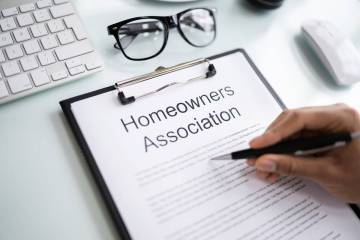Community wants to add designated spaces in parking lot
Q: What process does a homeowners association community go through to be a community with designated parking?
A: You would need to check your governing documents, in particular your covenants, conditions and restrictions, to determine if the board has the power to change the parking lot to accommodate designated spaces.
In addition, do check to see if the individual parking spaces are deeded to the unit owners as exclusive use.
Finally, changing the parking lot to one with designated spaces may require approval by the homeowners as it may fall under architectural change of the common area.
If there are no obstacles, your board would need a plan to send notification to the owners, as you can bet that you will have difference in opinions from your homeowners prior to voting on the change.
Q: My HOA board continuously cites Nevada Revised Statutes 116.31151(3) as a shield when questioned about the budget ratification in an open forum. They refuse to provide any reasonable answer.
Before I attempt to find another avenue to the legality of this statute, I hope you can put a light on the subject as presently we do not know where to turn.
A: Under NRS 116.31151 (3), a budget is either rejected or ratified. It states: “Unless at that meeting a majority of all of the unit owners or any larger vote specified in the declaration reject the proposed budget, the proposed budget is ratified, whether or not a quorum is present.”
That is the state law. It is not a question that a no vote means yes, The budget is ratified by default.
At the budget ratification meeting, association managers should allow owners to ask questions and provide answers even when they know the budget will be ratified for lack of the necessary numbers to reject the budget.
Q: There are so many NRS rules and regulations. Is there any way to do a search on — let’s say, the NRS rule on getting three bids from vendors on contracts for HOA’s or some other question — so I could get a fast reference on it.
A: I am not quite sure what you are asking. As far as bids, you would refer to NRS 116.31086. NRS 116 is divided into sections. The most commonly used are section III, which includes (in this order) general information, meetings and voting, liabilities, insurance, fiscal, miscellaneous rights and duties and restrictions, and Section IV. It includes protection of purchases.
Q: I have a perplexing question for you in regard to a couple of rules and regulations adopted by our HOA board here in Henderson. The sentences of concern are:
“The owners of the pet shall be solely responsible for the prompt and immediate removal of all feces deposited on the common areas or a residence site.”
“No garbage, refuse, discards or obnoxious or offensive materials shall be permitted to accumulate on any portion of the subject’s property.”
As no one on the HOA board or management company is inspecting any areas beyond what are visible from street view of a homeowner’s property, it would seem incumbent upon a neighbor to report any violations of this nature to the management company. As the homeowner would then know who reported the violation, this more often than not could lead to “un-neighborly relations.” I am curious as to how these types of violations that are only visible to an adjoining neighbor are handled by other HOAs.
A: Whenever possible, a friendly knock on the door to talk to your neighbor can help. Now, I know that many homeowners do not feel comfortable directly addressing the issue, so they contact the management company. Often, a management company will inform you that this is a neighbor-to-neighbor issue and that you should contact the Neighborhood Justice Center for assistance.
In both cases, whether the violation occurs within a residence or common area, for the most part, someone has to report the alleged violation to the management company. You would approach the alleged violation with a courtesy letter and when possible with a photograph. If the violation continues within the residence site, this would eventually lead to a hearing meeting with the homeowner.
Unfortunately, you cannot remove the potential “un-neighborly” relations.
Barbara Holland is an author and educator on real estate management. Questions may be sent to holland744o@gmail.com.

















